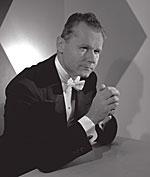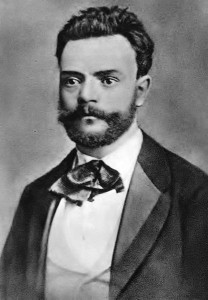Music Review: Masterworks Chorale’s Inspiring Tribute to Music Director Allen Lannom
The Masterworks Chorale sang better than I had ever heard them; perhaps they felt the sense of occasion—this was a piece that meant a great deal to Mr. Lannom, whose thoughts on the composition were featured in the program booklet.
By Susan Miron
Antonin Dvorák’s “Stabat Mater,” Op. 58, is a classic example of a composer creating a work of ineffable beauty and profound religious faith after a personal tragedy. In Dvorák’s case, there were multiple tragedies that might have left a composer of lesser faith struck mute. Dvorák began writing “Stabat Mater” in 1875 after the death of Josepha, his two-day-old daughter, then put it aside to work on other commissioned pieces. But in 1877, he returned to it after tragedy hit him and his wife yet again when, within a month, his daughter Ružena died of accidental poisoning and his three-year-old son Otakar perished from smallpox.
What emerged from this period of personal darkness was a work of unwavering religious faith and a great professional success for Dvorák. Performances in Brno (conducted by the young Leoš Janáček, Budapest, London, Germany, Austria, and the U.S. followed, not bad for a composer who had been an impoverished church organist only a short time before.
The Masterworks Chorale‘s performance of this work on Friday, March 11 at Sanders Theatre was a tribute to Allen Lannom on the fifth anniversary of his death. Lannom (1917–2006) had been—incredibly—the music director of Masterworks Chorale from 1952 until May 2005, and although he taught at Boston University and Boston Conservatory, it is for his work with this chorale that he is most remembered and admired.
Steven Karidoyanas conducted a moving performance of this work, which featured two of the soloists in the vocal quartet who had sung this piece under Mr. Lannom—mezzo-soprano Victoria Avetisyan and tenor Yeghishe Manucharyan. The soprano Andrea Matthews also had worked with Mr. Lannom. If the words of the “Stabat Mater” weren’t enough to move the singers, the memory of this conductor and his musical legacy in Boston’s concert life was. The piece was so dear to him that he wrote a poem about “Stabat Mater,” which was included in the program book.
The chorus sang better than I had ever heard them; perhaps they felt the sense of occasion—this was a piece that meant a great deal to Mr. Lannom, whose thoughts on the composition were featured in the program booklet. While most of the movements were on the slow side, and the texts were repeated innumerable times, the music of Dvorák when he is at his best sweeps you along, and this music was some of his best.
The orchestra was very good, although more strings would definitely have helped. There were two extraordinary moments—the deeply lustrous singing of mezzo-soprano Victoria Avetisyan in her impassioned aria “Inflammatus et accensus,” (Made ardent and enkindled, may I, through you, O Virgin, be defended on Judgment Day.) She is a powerful singer of great power to watch for, although the other soloists (soprano Andrea Matthews, bass-baritone Adrian Smith, tenor Yeghishe Manucharyan), all who had solo turns, were very good.
The tenor aria accompanied by tenors and basses, “Fac me vere tecum flere” (Make me truly weep with you) was, for me, the highlight of the evening. All of the men sounded great and broke up the endless andantes of the evening with a gorgeous, deeply rich sound.
Bravi to all who put on an evening of music that doubtless would have made Allen Lannom very proud.
Susan Miron, a harpist, has been a book reviewer for over 30 years for a large variety of literary publications and newspapers. Her fields of expertise were East and Central European, Irish, and Israeli literature. Susan covers classical music for The Arts Fuse and The Boston Musical Intelligencer.
Tagged: Allen Lannom, Antonín-Dvořák, chorus, Masterworks Chorale, Stabat Mater



To my ear it was one of the best performances done by the Masterworks Chorale, a masterful balance and blending of chorus, orchestra and soloists. It was a powerful and emotional rendering of Dvorak’s work.